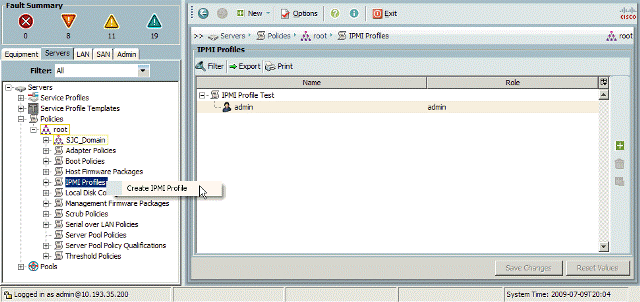Introduction
Intelligent Platform Management Interface (IPMI) is an open standard technology that defines how administrators monitor system hardware and sensors, control system components and retrieve logs of important system events to conduct remote management and recovery. IPMI runs on the BMC (Baseboard Management Controller) of the server blade and thus operates independently of the operating system. Since IPMI operates independent of the operating system, when sending commands to the BMC over IP, it provides administrators with the ability to monitor, manage, diagnose and recover systems, even if the operating system has hung or the server is powered down. In the UCS system, the BMC supports IPMI version 2.0 only.
UCS and IPMI profile
IPMI profile, also known as IPMI access profile, is a policy that allows you to determine whether IPMI commands can be sent directly to the server, using the IP address. In case of UCS the BMC on the blades is managed by the software running on the Cisco 6100 series fabric interconnect and the BMC is thus not directly available. Also the authentication for any access to the BMC is handled by the software running on fabric interconnect. In order to provide direct access to the BMC to make IPMI services available, IPMI profiles are created and assigned to the blades. An IPMI profile contains a username, password and a role for that username. The Admin role has full privileges and can carry out any necessary action on the blade; however the Read-Only access can be used only for monitoring or troubleshooting purposes. Whenever there is a request for direct access to the server BMC the fabric interconnect, although is able to see this request, allows a cut-through access to the BMC.
IPMI profile depends on the following resources:
- Username with appropriate permissions that can be authenticated by the operating system of the server
- Password for the username
- Permissions associated with the username
To create an IPMI profile navigate to Servers > Policies > root > Organization name (optional) > IPMI profiles.

IPMI Over LAN
IPMI defines the protocols for interfacing with a service processor embedded in a server platform. This service processor is called a Baseboard Management Controller (BMC), and resides on the server motherboard. The BMC links to a main processor and other on-board elements using a simple serial bus.
During normal operations, IPMI lets a server operating system obtain information about system health and control system hardware. For example, IPMI enables the monitoring of sensors, such as temperature, fan speeds and voltages, for proactive problem detection. If server temperature rises above specified levels, the server operating system can direct the BMC to increase fan speed or reduce processor speed to address the problem.
Related Information
What is a Service profile in UCS and what are its types
Understanding and Configuring Cisco UCS Maintenance Policy